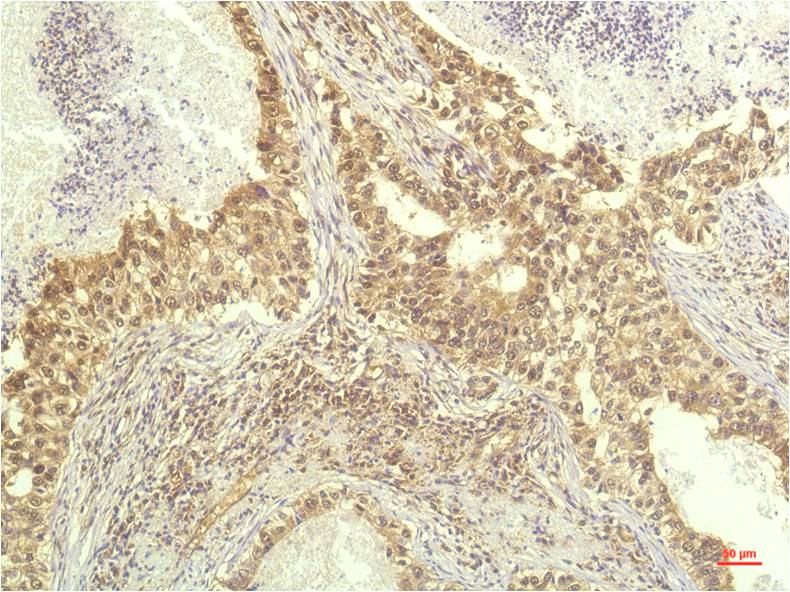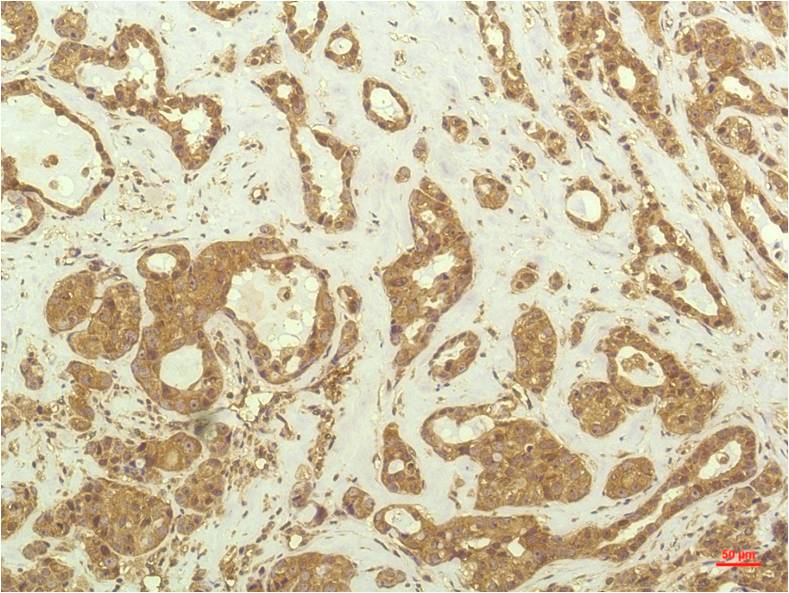Product Name : S6K1 (3A2) Mouse mAb
Cat.No.: db6627
Synonyms : RPS6KB1; STK14A; Ribosomal protein S6 kinase beta-1; S6K-beta-1; S6K1; 70 kDa ribosomal protein S6 kinase 1; P70S6K1; p70-S6K 1; Ribosomal protein S6 kinase I; Serine/threonine-protein kinase 14A; p70 ribosomal S6 kinase alpha; p70 S6 kinas
Reactivity : Human, Rat, Mouse
Host species : Mouse
Conjugation/Formulation:Un-conjugated
- Background Serine/threonine-protein kinase that acts downstream of mTOR signaling in response to growth factors and nutrients to promote cell proliferation, cell growth and cell cycle progression. Regulates protein synthesis through phosphorylation of EIF4B, RPS6 and EEF2K, and contributes to cell survival by repressing the pro-apoptotic function of BAD. Under conditions of nutrient depletion, the inactive form associates with the EIF3 translation initiation complex. Upon mitogenic stimulation, phosphorylation by the mammalian target of rapamycin complex 1 (mTORC1) leads to dissociation from the EIF3 complex and activation. The active form then phosphorylates and activates several substrates in the pre-initiation complex, including the EIF2B complex and the cap-binding complex component EIF4B. Also controls translation initiation by phosphorylating a negative regulator of EIF4A, PDCD4, targeting it for ubiquitination and subsequent proteolysis. Promotes initiation of the pioneer round of protein synthesis by phosphorylating POLDIP3/SKAR. In response to IGF1, activates translation elongation by phosphorylating EEF2 kinase (EEF2K), which leads to its inhibition and thus activation of EEF2. Also plays a role in feedback regulation of mTORC2 by mTORC1 by phosphorylating RICTOR, resulting in the inhibition of mTORC2 and AKT1 signaling. Mediates cell survival by phosphorylating the pro-apoptotic protein BAD and suppressing its pro-apoptotic function. Phosphorylates mitochondrial URI1 leading to dissociation of a URI1-PPP1CC complex. The free mitochondrial PPP1CC can then dephosphorylate RPS6KB1 at Thr-412, which is proposed to be a negative feedback mechanism for the RPS6KB1 anti-apoptotic function. Mediates TNF-alpha-induced insulin resistance by phosphorylating IRS1 at multiple serine residues, resulting in accelerated degradation of IRS1. In cells lacking functional TSC1-2 complex, constitutively phosphorylates and inhibits GSK3B. May be involved in cytoskeletal rearrangement through binding to neurabin. Phosphorylates and activates the pyrimidine biosynthesis enzyme CAD, downstream of MTOR.
- Immunogen Purified recombinant protein expressed in E.coli
-
Gene ID
6198
-
Swiss Prot
P23443
- Synonyms RPS6KB1; STK14A; Ribosomal protein S6 kinase beta-1; S6K-beta-1; S6K1; 70 kDa ribosomal protein S6 kinase 1; P70S6K1; p70-S6K 1; Ribosomal protein S6 kinase I; Serine/threonine-protein kinase 14A; p70 ribosomal S6 kinase alpha; p70 S6 kinas
- Reactivity Human, Rat, Mouse
- Application IHC-P
- Recommended dilution IHC: 1:50-1:100
- Host species Mouse
- Clonality Monoclonal
- Clonality No. 3A2-2E7-2D4
- Isotype IgG1
- Purity Affinity Purification
- Conjugation Un-conjugated
- Storage/Stability Store at -20°C. Supplied in PBS, 50% Glycerol(pH 7.3), 0.02% sodium azide and 0.5% BSA . Stable for 12 months from date of receipt.
-
 Immunohistochemistry analysis of paraffin-embedded Human Lung Carcinoma Tissue using S6K1 (3A2) antibody.High-pressure and temperature Sodium Citrate pH 6.0 was used for antigen retrieval.
Immunohistochemistry analysis of paraffin-embedded Human Lung Carcinoma Tissue using S6K1 (3A2) antibody.High-pressure and temperature Sodium Citrate pH 6.0 was used for antigen retrieval. -
 Immunohistochemical analysis of paraffin-embedded Human tonsils using S6K1 (3A2) antibody.High-pressure and temperature Sodium Citrate pH 6.0 was used for antigen retrieval.
Immunohistochemical analysis of paraffin-embedded Human tonsils using S6K1 (3A2) antibody.High-pressure and temperature Sodium Citrate pH 6.0 was used for antigen retrieval.
- Package Price (RMB)
- 50μL 1398
- 100μL 2398
- 货期:现货
